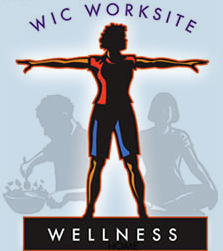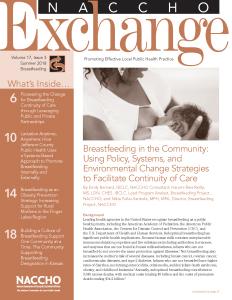|
Housing Resources
Adequate housing supports child development, education, mental and physical health, and more. WIC Can Help by referring families to local resources for keeping a roof over their heads.
|

Journaling for Mental Health
Most of us can list the lifestyle choices that help maintain and improve mental health. Regular exercise, eating a healthy diet, getting adequate sleep and staying socially active are all proven and well-known strategies.
Keeping a journal
is a powerful mental health tool, so find a quiet corner and get writing!
|
Shopping at Amazon?
Support CWA without spending anything extra by using
AmazonSmile!
|
Did someone share this with you? Sign up here to get the CWA Flash directly!
|
|
|

Public Charge Rule Proposal Announced
Over the weekend, the draft proposed rule changes to Public Charge were posted on the
Department of Homeland Security webpage
. We expect the Notice of Proposed Rule Making (NPRM) to be posted in the Federal Register this week. The proposed rule changes do impose greater restrictions on use of public benefits in determination of public charge, including use of Medicaid and SNAP among other programs and benefits, but WIC was excluded. While we are relieved to have WIC excluded, these harsh and discriminatory measures will impact critical services and the wellbeing of our communities.
Below are some highlights provided by National WIC Association:
- The changes are not immediately effective. The proposed regulation would not become legally effective until 60 days after a final rule is issued. A final rule cannot be issued until after a 60-day comment period, which is likely to last until after Thanksgiving. Therefore, we are not expecting this rule to be finalized until at least December 2018 or even into 2019.
- WIC participation will not impact an immigrant's legal status. Despite leaked drafts in the spring, the proposed regulation does not include any provision that would penalize an immigrant for accessing WIC benefits - either in a personal capacity or on behalf of a dependent child.
- DHS is still considering whether additional programs should be included in public charge. Even though WIC is not included in the proposed regulation, DHS is actively soliciting public comment on whether other programs should be considered in public charge determinations. The WIC community must continue to make the argument that WIC should not be included in public charge.
- SNAP, Medicaid, and housing subsidies are included in the proposal. Although WIC is not included in the proposed regulation, many programs that WIC families' access are implicated. The public charge rule will continue to have a significant negative impact on the health and food security of WIC families.
- The rule does not apply to all immigrants, consistent with prior drafts. The public charge rule does not apply to certain groups of immigrants, namely: those applying for citizens in a naturalization proceeding; undocumented individuals; and certain groups of humanitarian immigrants (refugees, asylees, Violence Against Women Act self-petitioners, Temporary Protected Status, etc.).
- The rule is not retroactive. Immigration officials will not consider use of benefits that predates the rule's applicable date. Therefore, those who are accessing affected programs now are not likely to be penalized in a public charge determination for their current use.
CWA has been an active participant organization in the Protecting Immigrant Families Campaign (PIF). Your involvement will be very important in the coming weeks and months to protect families and services. ACTION: Join the Protecting Immigrant Families Campaign ListServ for the most current information including updates, talking points and strategies for the comment period. Read the news releases. Use NWA's template press release to make sure your community has the most accurate information. Contact Sarah with questions.
|

Register and Vote!
Plan to vote, and also get your friends, family and neighbors to register and vote! VOTE in the midterm election, November 6, just over a month away! This is an especially important election as the nation grapples with many issues that impact low-income families, immigrants, people of color, health care access, voting rights, environmental protections and more. Our newly elected decision makers will have the power and opportunity to contribute to these conversations and also vote on actions with lasting effects. ACTION: Not yet registered? Register by Oct. 22. Want to vote by mail? Want to tell others how to vote? Who can vote? Did you know 16 and 17 year olds can pre-register to vote and will automatically be registered on their 18th birthday.
|
WIC Fall Convening
Local WIC agencies and state staff gather each fall to focus on critical issues for platinum services and maximizing participation. Make plans to attend the state sponsored sessions, Mon. Nov. 5 and the morning of Tues. Nov. 6. CWA will sponsor the afternoon of Tues. Nov. 6 where you will learn about the new Smile, California campaign and improvements addressing access to oral health care, recruitment and retention issues and strategies for the WIC workforce, and state efforts to improve linkages for WIC and other health and social services programs. Units for continuing education are provided for nutrition and lactation. ACTION: Register here! Hotel information is on our Events webpage. Check out the CWA agenda.
|
WIC Capitol Education Day - Nov. 7!
Be sure to be part of this very important opportunity, especially with the upcoming midterm elections to provide information to your representative in Sacramento about your WIC program. You would be surprised at how often staff and representatives are not aware of WIC program benefits and impact, and the needs of local families. We are also the state's largest nutrition and lactation public health workforce, an excellent resource for decision makers. Join your colleagues the morning of November 7th, from 8 AM - 12 PM. Breakfast and all materials will be provided. ACTION: Register here! Check out the flyer. Start making appointments with your representative. Have questions or not sure what to do? Sarah can help!
|

Large Doses of Folic Acid Don't Reduce Preeclampsia Risk
A small amount of folic acid is proven to reduce the risk for the serious birth defects called neural tube defects, so prenatal vitamins contain the nutrient and many grain products are enriched with it. Some
evidence has suggested
that larger doses may lower the risk for pre-eclampsia,
but a new study
has not confirmed that hypothesis. A group of 2,464 women who had at least one risk factor for pre-eclampsia, participated: half received 4.0 milligrams of folic acid a day, and half got daily placebo tablets along with 1.1 milligrams of folic acid. There was no difference between the groups in incidence of pre-eclampsia or any other negative outcome, such as stillbirth, they tracked.
|

Sweetened Yogurts May Not be So Healthy
Yogurt is a product that enjoys a "health halo" - people think of it as healthy, and it is marketed as such, but a study published this week found that the average amount of sugar across yogurt categories (children's, organic, flavored, etc.) in U.K. supermarkets was well above 10 grams per 100 gram serving. Yogurts sold in the U.S. have similar sugar contents. Organic yogurts were among the sweetest, with median sugar content at 13.1 grams per 100 gram serving, and some brands at nearly 17. While yogurt is a good source of probiotic cultures, protein, calcium, iodine, and vitamin B12,consumers may get around 25 percent or more of the WHO's recommended daily sugar limit for adults from just one serving of yogurt. Experts recommend choosing Greek or natural yogurts with fewer than 10 grams of sugar.
|

Socio-Economic Disparities in ACEs
The largest nationally representative study to date on adverse childhood experiences (ACEs) -highlights some disparities among socioeconomic groups. People with low-income and educational attainment, people of color and people who identified as gay, lesbian or bisexual had significantly higher chance of having experienced adversity in childhood. A quarter of adults have at least three such experiences in childhood, which - according to other research - increases their risk for most common chronic diseases, from heart disease and cancer to depression and substance abuse. Studies have linked a greater number of ACEs with greater risk of heart disease, cancer, bone fractures and chronic lung or liver diseases, diabetes and stroke. Those with the most ACEs, four to six or more, tend to have higher rates of mental illness. Researcher say that to address the consequences of childhood adversity, it will be important to develop programs that help children learn healthy coping mechanisms and strengthen families and communities overall.
|

Breastfeeding Care Continuums: Best Practices
The summer edition of the National Association County and City Health Officials (NACCHO)
Exchange
newsletter provides highlights of a CDC funded grant to NACCHO to reduce disparities in breastfeeding through peer and professional support. The grant projects focused on policy, systems and environmental improvements, continuums of care, involvement of local health jurisdictions and public-private partnerships. California is well represented! Contra Costa County Health Services, including Contra Costa WIC, is showcased for establishing a public-private county breastfeeding care continuum. Santa Barbara WIC and Meg Beard, Breastfeeding Coordinator, feature the agency for its best practices in use of texting for breastfeeding support. Emily Bernard, NACCHO consultant and author, is also on staff at California Breastfeeding Coalition. Keep it up California!
|
Locate WIC Farmers' Markets on Your Phone
It is always a great time to shop at a Farmers' Market and that includes also for California WIC participants. More and more farmers and farmers' markets are authorized to accept WIC checks. It just became easier to locate the markets using the mobile WIC website, provided by California Dept. of Public Health (CDPH). In addition to many other WIC program features on the mobile website, one can find farmers' market locations, days and hours of operation. Check the link and head to the market for fresh, local produce and meet the farmers and market staff! Looking for information on becoming authorized to accept WIC checks at farmers' markets? Check out the CDPH and CWA information and resources.
|
Nutrition Needs of Very Low Birth Weight Infants: New Toolkit!
Even though postnatal growth failure rates have declined in the last decade, there is still a fifty percent growth failure rate for very low birth weight (VLBW) infants. Taking care of preterm, ill and VLBW infants is complex and nutrition is critical for healthy outcomes. For VLBW infants the first two weeks are critical. Check out the recently updated
toolkit
, provided by California Perinatal Quality Care Collaborative (CPQCC) with resources for hospital neonatal intensive care units (NICU).
|
Lactation Support Provider Pathways Resource
The U.S. Breastfeeding Committee, in partnership with the Lactation Support Providers Constellation, has launched a webpage with
lactation support provider pathways information
. This informational page is a supplement to the
Lactation Support Provider Training Directory
, and discusses different options and paths that exist to become a Lactation Support Provider. The information provided here includes the different ways to qualify for credentialing exams as well as training opportunities that are tailored to community needs. If you are a member of a national organization and want to submit information about training opportunities, please contact
[email protected]
.
|
Survey for Organizations Supporting Black Families with Breastfeeding
Reaching Our Sisters Everywhere
and
HealthConnect One
have launched a
survey of local and national organizations
as part of an effort to develop a national blueprint that will provide an assessment of the landscape of breastfeeding support for black families in the U.S. Information will be gathered to identify current needs, which will be used to target problem areas in underserved communities specifically. ROSE and HCO want to better understand the availability and accessibility of culturally responsive breastfeeding support. Surveys must be complete by Friday, October 5, at 6 p.m. ET.
|
|
|